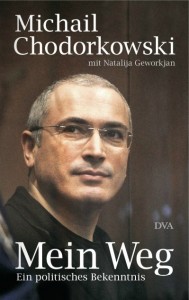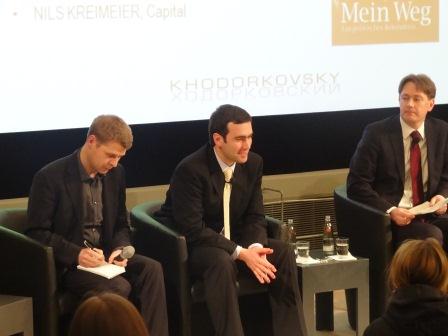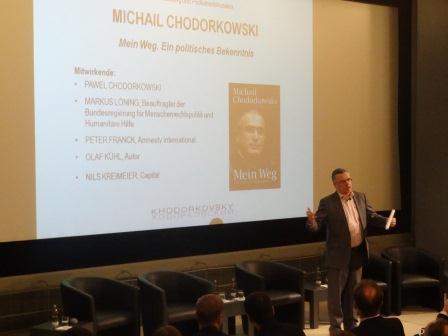Pavel Khodorkovsky Presents His Father’s Book in Berlin
 On January 24, 2013, more than 200 people attended Pavel Khodorkovsky’s presentation of his father’s book, “My Way – A political confession”, at the Martin-Gropius-Bau in Berlin. Mikhail Khodorkovsky’s book, co-written with Russian journalist Natalya Gevorkyan, was published in Germany in October 2012. It describes the developments in Russia in the 90s, the history of the Yukos Oil Company and Khodorkovsky’s life in prison. The book also outlines Khodorkovsky’s views on contemporary Russia, the autocratic structure of the Putin regime and his vision for Russia’s future.
On January 24, 2013, more than 200 people attended Pavel Khodorkovsky’s presentation of his father’s book, “My Way – A political confession”, at the Martin-Gropius-Bau in Berlin. Mikhail Khodorkovsky’s book, co-written with Russian journalist Natalya Gevorkyan, was published in Germany in October 2012. It describes the developments in Russia in the 90s, the history of the Yukos Oil Company and Khodorkovsky’s life in prison. The book also outlines Khodorkovsky’s views on contemporary Russia, the autocratic structure of the Putin regime and his vision for Russia’s future.
Pavel spoke about his father and the impact his father’s imprisonment has had on the Khodorkovsky family. He described how much he values the ten-minute phone conversations he is able to have with his father every other week, but longs for the day when he can meet him face to face. Pavel also emphasised Khodorkovsky’s role as a symbol for the liberal opposition in Russia. “After ten years he is an example to us all,” he said, “and he has not allowed himself to be broken.”
Markus Loening, Germany’s Federal Commissioner for Human Rights, attended the Berlin book presentation. In a keynote address, Loening spoke about his shock at what he saw when attending Khodorkovsky’s second trial in Moscow back in 2010. He underlined that Germany needs to demonstrate its clear support for Russian civil society, noting that under Putin individual rights are under attack.
Olaf Kuehl, the author of “Dead Animals”, a novel about two friends who attempt to release Khodorkovsky from his Russian prison camp, read selected chapters from Khodorkovsky’s book. The readings described in detail Khodorkovsky’s situation in prison as well as his views on the political, economic and social reforms needed for a better future in Russia.
Peter Frank, a Russia expert from Amnesty International, emphasised that the Khodorkovsky case is not only important in its own right, but also is symbolic and symptomatic of the wider violations of human rights in Russia. Amnesty ran a stand at the event where attendees signed a petition calling for Khodorkovsky’s release.
The event came during a busy week of campaigning for Pavel, the president of the Institute of Modern Russia (IMR). Earlier in the week he attended the Parliamentary Assembly of the Council of Europe in Strasbourg, where he met with parliamentarians from across Europe and opened the IMR’s Russian Visionaries exhibition there. He also wrote to attendees of the World Economic Forum in Davos, reminding them of his father’s continued imprisonment and the damage caused to Russia by corruption and the abuse of power.
 Pavel Khodorkovsky during the panel talk
Pavel Khodorkovsky during the panel talk
 Markus Loening, Germany’s Federal Commissioner for Human Rights
Markus Loening, Germany’s Federal Commissioner for Human Rights



